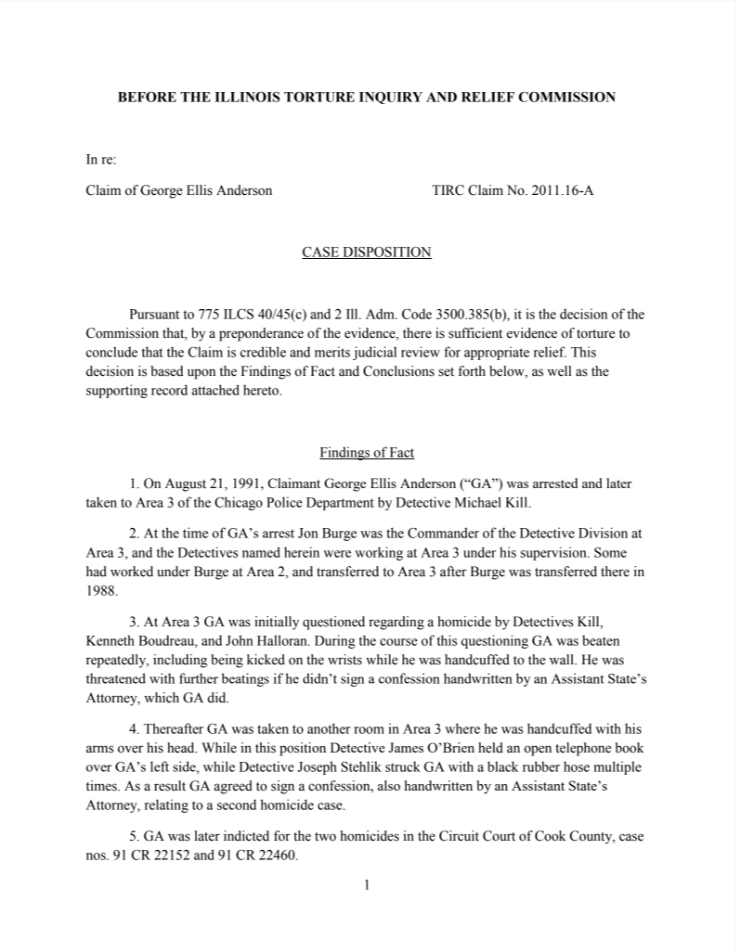George Anderson was convicted of the 1991 murders of both an 11-year-old boy in Englewood and a 14-year-old girl who was killed around the same time. Anderson said that he was tortured by several police officers working under the command of Jon Burge who extracted false confessions for the two murders.
A 2012 investigation by the Illinois Torture Inquiry and Relief Commission found his claims to be credible. However, in early 2020, a Cook County judge disagreed and ruled against Anderson’s bid for a new trial and he remained incarcerated.
The Killing of Jeremiah Miggins and Area 3
On the afternoon of August 21, 1991, 11-year-old Jeremiah Miggins was walking to his Englewood home after helping a neighbor with some yard work. Suddenly, a stray bullet, apparently from a gunfight elsewhere, tore through a fence and hit him in the chest, killing [add “him” here, unless other children were killed as well] and rattling several other children at the scene, according to the Chicago Tribune and DNA Info.
Police arrested George Anderson, a mechanic living in Englewood, on the same day of the shooting and brought him to Area 3, where he claims to have been tortured by several Chicago police officers under the command of Burge.
Anderson says he initially refused to be questioned by police and repeatedly asked for an attorney, but Detectives Kenneth Boudreau, Michael Kill, and John Halloran refused, handcuffed him, kicked him, and left him without food or water for hours. Anderson says he was threatened with further beatings if he didn’t sign a confession handwritten by an assistant prosecutor.
Anderson eventually agreed and signed a document implicating himself as the driver in the shooting of Jeremiah Miggins.
Then, Anderson says he was taken to a separate room, handcuffed again—this time with his arms over his head—and beaten more. Anderson told a court that Detective James O’Brien hit him with a telephone book on his left side while Detective Joseph Stehlik struck him with a black rubber hose repeatedly. After enduring this, Anderson says he agreed to sign another handwritten confession by a prosecutor admitting to the murder of Kathryn Myles, a 14-year-old who had been gunned down a month prior to Miggins.
Anderson Awaits Trial
As Anderson awaited trial at the Cook County Jail, Jerome Johnson and Michael Sutton, according to a later appeals court description of the case, were determined to be the primary offenders in the shooting of Jeremiah Miggins and were found guilty in separate trials. Johnson also pleaded guilty to the murder of Kathryn Myles. He has since denied any involvement with either murder and claims to have been tortured by the same detectives as George Anderson.
Anderson also became sick while he was awaiting trial in jail—enduring a fever, pain on his side, and blood while urinating every few weeks. In 1993, Anderson was diagnosed with a ureteropelvic junction obstruction, a blockage in part of the urinary system caused by trauma to the kidney, requiring surgery. At the time, the doctor said the injury could have killed Anderson.
Despite surgery, Anderson still experiences health issues caused by the injury to his kidney, according to an investigation by the Chicago Alliance Against Racist and Political Repression.
A few months before his trial, Anderson recanted his confession and asked the court to suppress it from the record, stating he was beaten into confessing by detectives at Area 3. However, Judge Urso denied the motion based on testimony by Detectives Kill, Boudreau, Stehlik, and O’Brien stating they never abused Anderson. Burge’s 1993 termination and history of abuse was never brought up, and the confession was used against him at his trial.
The Trial of George Anderson
In 1994, Anderson was charged with first-degree murder and attempted first-degree murder for his role in the shooting of Jeremiah Miggins. During the bench trial, prosecutors claimed Anderson was guilty under the “accountability theory.”
Prosecutors argued that Anderson gave Jerome Johnson a ride to a stolen car on the afternoon of August 21, 1991, knowing he was armed. Therefore, he knew a confrontation was imminent and that Johnson was going to use this stolen vehicle to avoid detection while fleeing the scene. Then, Anderson apparently drove Johnson from the scene after the shooting. In summary, although Anderson did not pull the trigger, he was just as responsible for the death of Jeremiah Miggins as Johnson, state prosecutors argued.
Anderson testified that he signed a statement written by the state’s attorney in which he confessed to knowing Johnson was armed because he anticipated trouble. However, he claimed he “did not understand what he was signing because he was too nervous,” according to an appellate court summary of the case.
Anderson was convicted of the murder of Jeremiah Miggins in November of 1994.
A fight for justice
The officers Anderson was involved with—Detectives Kill, O’Brien, Boudreau, and Halloran—have been accused by dozens of abuse. Many of the allegations against these officers, all of whom have since left the force, bear several similarities to what Anderson said happened to him.
A 2012 finding by the Illinois Torture Inquiry and Relief Commission found Anderson’s allegations of torture to be credible and that his case merits a new hearing.
In January 2020, Cook County Judge William Hooks said Anderson was lying about his abuse and trying to take advantage of others’ successful challenges to their Burge-era convictions. “Anderson has falsely claimed to have ridden on the Burge torture bus and he knows it,” the judge wrote in his ruling, citing a lack of medical evidence in his appeal, according to the Chicago Sun-Times. Anderson’s lawyers have said they would appeal the decision.
As of early 2020, Anderson was 57 years old and remained behind bars at Stateville Correctional Center, a maximum-security prison in Crest Hill, Illinois.
— Written by Ellen Glover
Documents
Media
Chicago Tribune report. August 22, 1991. The article describes the shooting of Jeremiah Miggins.
DNA Info report. April 11, 2013. A judge appoints a special prosecutor to look into allegations of torture rather than allow Cook County State’s Attorney Anita Alvarez to represent the state in the case against George Anderson.




